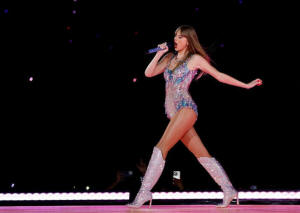Universal Music Group artists to return to TikTok after new licensing
pact
 Send a link to a friend
Send a link to a friend
 [May 02, 2024]
By Dawn Chmielewski and David Shepardson [May 02, 2024]
By Dawn Chmielewski and David Shepardson
(Reuters) -Universal Music Group and TikTok said on Thursday they had
reached a new licensing agreement that will restore the label's songs
and artists to the social media platform as well as give musicians more
protections from artificial intelligence.
TikTok began removing Universal's content from its app after their
licensing deal expired in January and the two sides failed to reach
agreement on royalties, AI and online safety for TikTok's users.
Describing their new pact as a multi-dimensional deal, the companies
said they were working "expeditiously" to return music by the label's
artists to TikTok, and also said they would team up to realise new
monetization opportunities from TikTok's growing e-commerce
capabilities.
They will "work together on campaigns supporting UMG's artists across
genres and territories globally," the two firms said in a joint
statement.
The short video app is a valuable marketing and promotional tool for the
music industry. TikTok is where 16- to 19-year-olds in the United States
most commonly discover music, ahead of YouTube and music streaming
services such as Spotify, according to Midia Research.
"Roughly a quarter of U.S. consumers say they listen to songs they have
heard on TikTok," said Tatiana Cirisano, Midia's senior music industry
analyst.
However, Universal Music claimed its artists and songwriters are paid
just a fraction of what it receives from other major social media
platforms.
The music label says TikTok accounts for 1% of its annual revenue or
about $110 million in 2023. YouTube, by contrast, paid the music
industry $1.8 billion from user-generated content in the 12 months
ending in June 2022, according to Midia.
In a move that may well have eroded its bargaining power, Taylor Swift,
one of Universal Music's biggest acts, allowed a selection of her songs
to return to TikTok as she promoted her latest album, "The Tortured
Poets Department."
Swift owns the copyrights to her recordings through her 2018 deal with
Universal and can control where her songs are available, according to
the Financial Times.

[to top of second column]
|

Singer Taylor Swift performs at her concert for the international
"The Eras Tour" in Tokyo, Japan February 7, 2024. REUTERS/Kim Kyung-Hoon
 As licensing negotiations resumed in
recent weeks, AI remained a major point of contention. Universal has
claimed TikTok is "flooded" with AI-generated recordings, including
songs that users create with the help of TikTok's AI songwriting
tools.
In Thursday's deal, TikTok and Universal said that they would work
together to ensure AI development across the music industry will
protect human artistry and the economics that flow to those artists
and songwriters.
"TikTok is also committed to working with UMG to remove unauthorized
AI-generated music from the platform, as well as (developing) tools
to improve artist and songwriter attribution," the statement said.
Concerns about AI have grown in the creative community. In April, a
non-profit group called the Artist Rights Alliance published an open
letter urging the responsible use of the technology. The group of
more than 200 musicians and songwriters called on technology
companies and digital music services to pledge not to deploy AI in a
way that would "undermine or replace the human artistry of
songwriters and artists or deny us fair compensation for our work."
The deal comes amid questions over TikTok's long-term future in the
United States. President Joe Biden signed legislation last week that
gives TikTok's Chinese owner, ByteDance, 270 days to sell its U.S.
assets. TikTok has vowed to file suit to challenge the legislation,
which it calls a ban.
More than 170 million Americans use its video service, according to
TikTok. Globally, it has more than 1.5 billion monthly active users,
according to research firm Statista.
(Reporting by Dawn Chmielewski in Los Angeles and David Shepardson
in Washington, D.C.; Additional reporting by Miyoung Kim in
Singapore; Editing by Peter Henderson, Chris Reese, and Edwina
Gibbs)
[© 2024 Thomson Reuters. All rights
reserved.] This material may not be published,
broadcast, rewritten or redistributed.
Thompson Reuters is solely responsible for this content. |